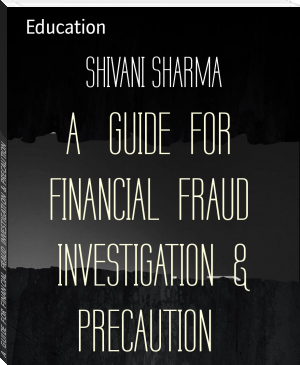A GUIDE FOR FINANCIAL FRAUD INVESTIGATION & PRECAUTION by SHIVANI SHARMA (thriller books to read txt) 📖

- Author: SHIVANI SHARMA
Book online «A GUIDE FOR FINANCIAL FRAUD INVESTIGATION & PRECAUTION by SHIVANI SHARMA (thriller books to read txt) 📖». Author SHIVANI SHARMA
The legal status of pornography varies widely from country to country. Most countries allow at least some form of pornography. In some countries, softcore pornography is considered tame enough to be sold in general stores or to be shown on TV. Hardcore pornography, on the other hand, is usually regulated. The production and sale, and to a slightly lesser degree the possession, of child pornography is illegal in almost all countries, and some countries have restrictions on pornography depicting violence, for example rape pornography or animal pornography.
 Pornographic entertainment on display in a sex shop window, where there is usually a minimum age to go into pornographic stores
Pornographic entertainment on display in a sex shop window, where there is usually a minimum age to go into pornographic stores
Most countries attempt to restrict minors' access to hardcore materials, limiting availability to sex shops, mail-order, and television channels that parents can restrict, among other means. There is usually an age minimum for entrance to pornographic stores, or the materials are displayed partly covered or not displayed at all. More generally, disseminating pornography to a minor is often illegal. Many of these efforts have been rendered practically irrelevant by widely available Internet pornography. A failed US law would have made these same restrictions apply to the internet.
In the United States, a person receiving unwanted commercial mail he or she deems pornographic (or otherwise offensive) may obtain a Prohibitory Order, either against all mail from a particular sender, or against all sexually explicit mail, by applying to the United States Postal Service. There are recurring urban legends of snuff movies, in which murders are filmed for pornographic purposes. Despite extensive work to ascertain the truth of these rumors, law enforcement officials have not found any such works.
Some people, including pornography producer Larry Flynt and the writer Salman Rushdie,[81] have argued that pornography is vital to freedom and that a free and civilized society should be judged by its willingness to accept pornography.
The UK government has criminalized possession of what it terms "extreme pornography" following the highly publicized murder of Jane Longhurst.
Child pornography is illegal in most countries, with a person most commonly being a child until the age of 18 (though the age varies). In those countries, any film or photo with a child subject in a sexual act is considered pornography and illegal.
Pornography can infringe into basic human rights of those involved, especially when consent was not obtained. For example, revenge porn is a phenomenon where disgruntled sexual partners release images or video footage of intimate sexual activity, usually on the internet.[82] In many countries there has been a demand to make such activities specifically illegal carrying higher punishments than mere breach of privacy or image rights, or circulation of prurient material.[83][84] As a result, some jurisdictions have enacted specific laws against "revenge porn".[85]
What is not pornography
In the U.S., a July 2014 criminal case decision in Massachusetts, Commonwealth v. Rex, 469 Mass. 36 (2014),[86] made a legal determination of what was not to be considered "pornography" and in this particular case "child pornography".[87] It was determined that photographs of naked children that were from sources such as National Geographic magazine, a sociology textbook, and a nudist catalog were not considered pornography in Massachusetts even while in the possession of a convicted and (at the time) incarcerated sex offender.[87]
Drawing the line depends on time and place, Occidental mainstream culture got increasingly "pornified" (i.e. tainted by pornographic themes and mainstream movies got to include unsimulated sexual acts).[88]
Copyright status
In the United States, some courts have applied US copyright protection to pornographic materials.[89][90] Although the first US copyright law specifically did not cover obscene materials, the provision was removed subsequently.[when?] Most pornographic works are theoretically work for hire meaning pornographic models do not receive statutory royalties for their performances. Of particular difficulty is the changing community attitudes of what is considered obscene, meaning that works could slip into and out of copyright protection based upon the prevailing standards of decency. This was not an issue with the copyright law up until 1972 when copyright protection required registration. The law was changed to make copyright protection automatic, and for the life of the author.[citation needed]
Some courts have held that copyright protection effectively applies to works, whether they are obscene or not,[91] but not all courts have ruled the same way.[92] The copyright protection rights of pornography in the United States has again been challenged as late as February 2012.[89][93]
Views on pornographyMain article: Opposition to pornography A caricature on "the great epidemic of pornography", 19th-century French illustration
A caricature on "the great epidemic of pornography", 19th-century French illustration
Views and opinions of pornography come in a variety of forms and from a diversity of demographics and societal groups. Opposition of the subject generally, though not exclusively,[94] comes from three main sources: law, feminism and religion.
Feminist viewsMain article: Feminist views of pornography
Many feminists, including Andrea Dworkin and Catharine MacKinnon, argue that all pornography is demeaning to women or that it contributes to violence against women, both in its production and in its consumption. The production of pornography, they argue, entails the physical, psychological, or economic coercion of the women who perform in it, and where they argue that the abuse and exploitation of women is rampant; in its consumption, they charge that pornography eroticizes the domination, humiliation and coercion of women, and reinforces sexual and cultural attitudes that are complicit in rape and sexual harassment.[95][96][97] They charge that pornography presents a severely distorted image of sexual relations, and reinforces sex myths; that it always shows women as readily available and desiring to engage in sex at any time, with any man, on men's terms, always responding positively to any advances men make.[98]They argue that because pornography often shows women enjoying and desiring to be violently attacked by men, saying "no" when they actually want sex, fighting back but then ending up enjoying the act – this can affect the public understanding of legal issues such as consent to sexual relations.[99]
In contrast to these objections, other feminist scholars argue that the lesbian feminist movement in the 1980s was good for women in the porn industry.[100] As more women entered the developmental side of the industry, this allowed women to gear porn more towards women because they knew what women wanted, both for actresses and the audience.[100] This is believed to be a good thing because for such a long time, the porn industry has been directed by men for men.[100] This also sparked the arrival of making lesbian porn for lesbians instead of men.[100]
Furthermore, many feminists argue that the advent of VCR and consumer video allowed for the possibility of feminist pornography.[101] Consumer video made it possible for the distribution and consumption of video pornography to locate women as legitimate consumers of pornography. Tristan Taormino says that feminist porn is "all about creating a fair working environment and empowering everyone involved."[102] Feminist porn directors are interested in challenging representations of men and women, as well as providing sexually-empowering imagery that features many kinds of bodies.[103]
In a 1995 essay for The New Yorker, writer Susan Faludi argued that porn was one of the few industries where women enjoy a power advantage in the workplace. "'Actresses have the power,' Alec Metro, one of the men in line, ruefully noted of the X-rated industry. A former firefighter who claimed to have lost a bid for a job to affirmative action, Metro was already divining that porn might not be the ideal career choice for escaping the forces of what he called 'reverse discrimination.' Female performers can often dictate which male actors they will and will not work with. 'They make more money than us.' Porn – at least, porn produced for a heterosexual audience – is one of the few contemporary occupations where the pay gap operates in women's favor; the average actress makes fifty to a hundred per cent more money than her male counterpart. But then she is the object of desire; he is merely her appendage, the object of the object."[104]
Harry Brod offered a Marxist feminist view, "I [Brod] would argue that sex seems overrated [to men is] because men look to sex for fulfillment of nonsexual emotional needs, a quest doomed to failure. Part of the reason for this failure is the priority of quantity over quality of sex which comes with sexuality's commodification."
CHILD Pornography
Child pornography is pornography that exploits children for sexual stimulation.[7] It may be produced with the direct involvement or sexual assault of a child (also known as child sexual abuse images[8][9][10]) or it may be simulated child pornography. Abuse of the child occurs during the sexual acts or lascivious exhibitions of genitals or pubic areas which are recorded in the production of child pornography.[13] Child pornography may use a variety of media,[14] including writings,[8][15][16]
 The desire to acquire knowledge about the surrounding world and human society is quite natural and understandable for a person. Life is so developed that an uneducated person will never occupy a high position in any field. Humanity in its mass, and each person individually, develops objectively, regardless of certain life circumstances and obstacles, but with different intensity. The speed of development depends on the quality of training.
The desire to acquire knowledge about the surrounding world and human society is quite natural and understandable for a person. Life is so developed that an uneducated person will never occupy a high position in any field. Humanity in its mass, and each person individually, develops objectively, regardless of certain life circumstances and obstacles, but with different intensity. The speed of development depends on the quality of training.




Comments (0)